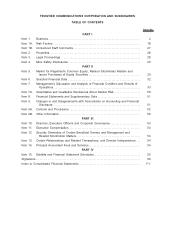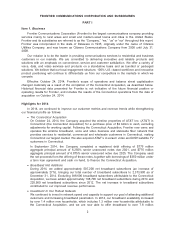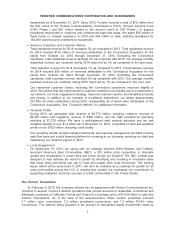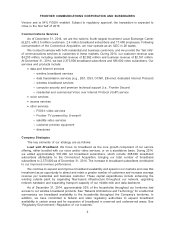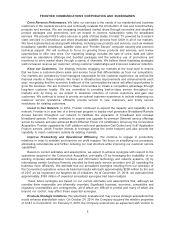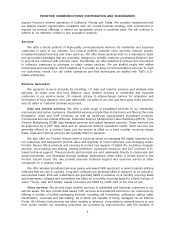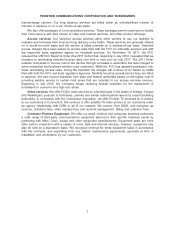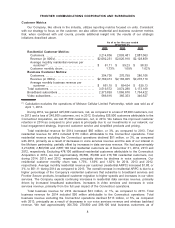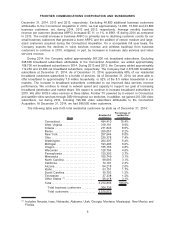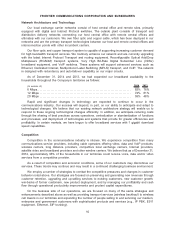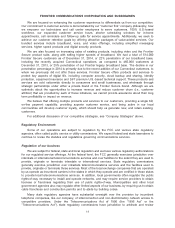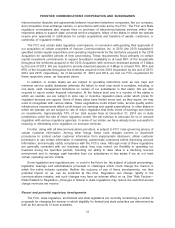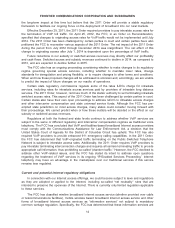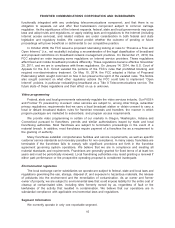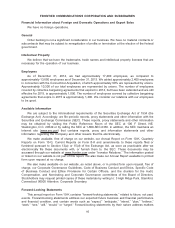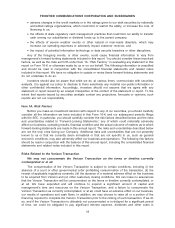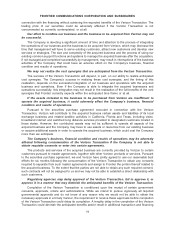Frontier Communications 2014 Annual Report Download - page 12
Download and view the complete annual report
Please find page 12 of the 2014 Frontier Communications annual report below. You can navigate through the pages in the report by either clicking on the pages listed below, or by using the keyword search tool below to find specific information within the annual report.We are focused on enhancing the customer experience to differentiate us from our competition.
Our commitment to customer service is demonstrated by our “customer first” company philosophy, how
we empower our technicians and call center employees to serve customers, 100% U.S.-based
workforce, our expanded customer service hours, shorter scheduling windows for in-home
appointments, call reminders and follow-up calls for service appointments. Additionally, we seek to
achieve our customer retention goals by offering attractive packages of value-added services. Our
bundled services include broadband, voice, and video offerings, including simplified messaging
services, higher speed products and digital security products.
We are also focused on increasing sales of existing products, including video and the Frontier
Secure product suite, along with selling higher speeds of broadband. We had a total of 514,000
Frontier Secure customers as of December 31, 2014, or 22% penetration of our broadband base,
including the recently acquired Connecticut operations, as compared to 465,000 customers at
December 31, 2013, or 25% penetration of our Frontier legacy broadband base. The decline in our
penetration percentage in 2014 is primarily due to the recent addition of our Connecticut customers, to
whom we previously did not offer these services. Frontier Secure offers products and services to
protect key aspects of digital life, including computer security, cloud backup and sharing, identity
protection, equipment insurance and 24/7 premium U.S.-based technical support. These products and
services are sold nationwide directly to consumers and small businesses, and wholesale through
strategic partnerships under either a private brand or the Frontier Secure brand. Although we are
optimistic about the opportunities to increase revenue and reduce customer churn (i.e., customer
attrition) that are provided by each of these initiatives, we cannot provide assurance about their long
term profitability or impact on revenue.
We believe that offering multiple products and services to our customers, providing a single bill,
on-line payment capability, providing superior customer service, and being active in our local
communities will develop customer loyalty, which should help us generate new, and retain existing,
customers.
For additional discussion of our competitive strategies, see “Company Strategies” above.
Regulatory Environment
Some of our operations are subject to regulation by the FCC and various state regulatory
agencies, often called public service or utility commissions. We expect federal and state lawmakers to
continue to revise the statutes and regulations governing communications services.
Regulation of our business
We are subject to federal, state and local regulation and we have various regulatory authorizations
for our regulated service offerings. At the federal level, the FCC generally exercises jurisdiction over
interstate or international telecommunications services and over facilities to the extent they are used to
provide, originate or terminate interstate or international services. State regulatory commissions
generally exercise jurisdiction over intrastate telecommunications services and the facilities used to
provide, originate or terminate those services. Most of the local exchange companies that are operated
by us operate as incumbent carriers in the states in which they operate and are certified in those states
to provide local telecommunications services. In addition, local governments often regulate the public
rights-of-way necessary to install and operate networks, and may require service providers to obtain
licenses or franchises regulating their use of public rights-of-way. Municipalities and other local
government agencies also may regulate other limited aspects of our business, by requiring us to obtain
cable franchises and construction permits and to abide by building codes.
Many state regulatory agencies have substantial oversight over the provision by incumbent
telephone companies, like our company, of interconnection and non-discriminatory network access to
competitive providers. Under the Telecommunications Act of 1996 (the “1996 Act” or the
“Telecommunications Act”), state regulatory commissions have jurisdiction to arbitrate and review
11
FRONTIER COMMUNICATIONS CORPORATION AND SUBSIDIARIES


